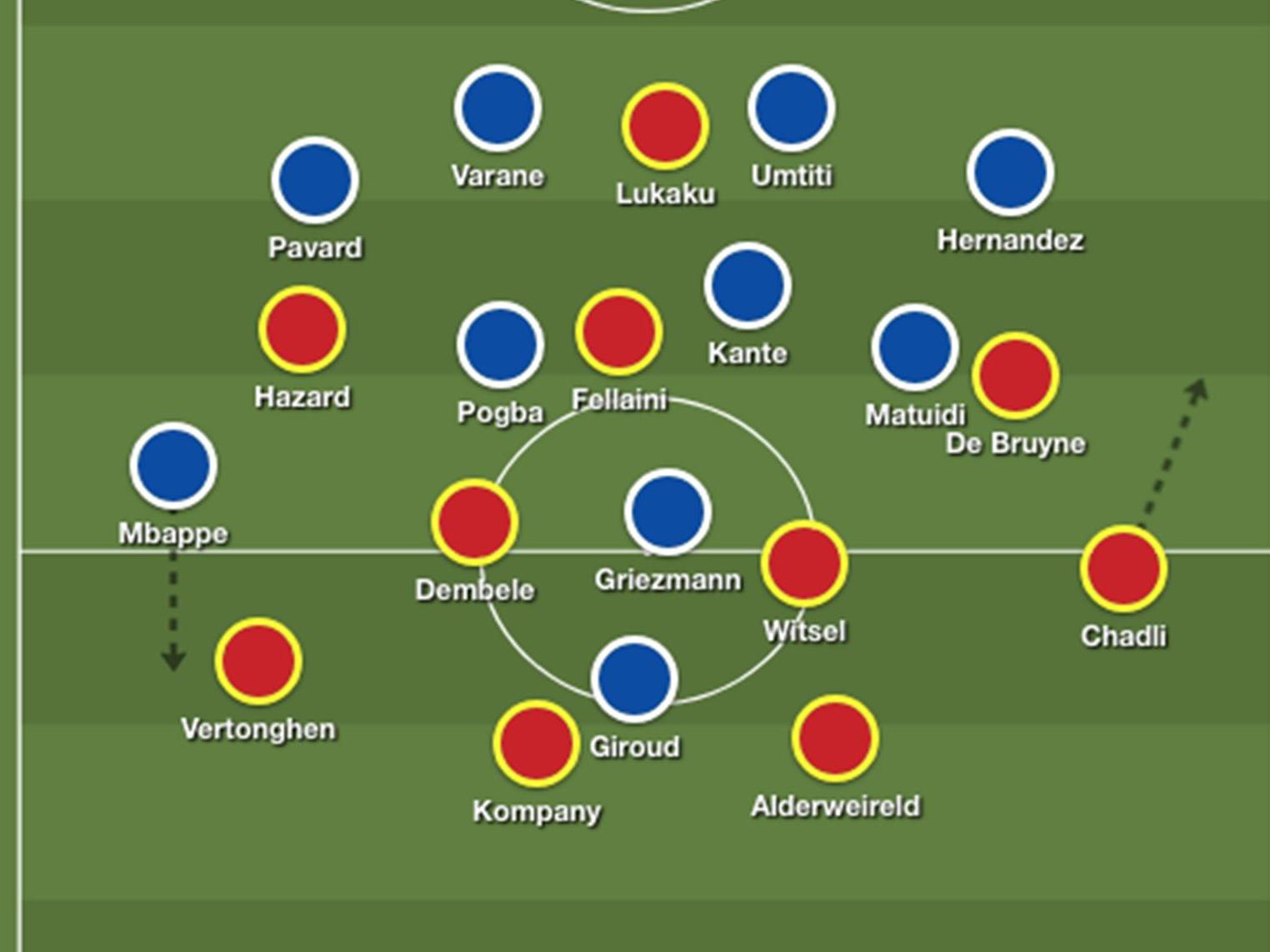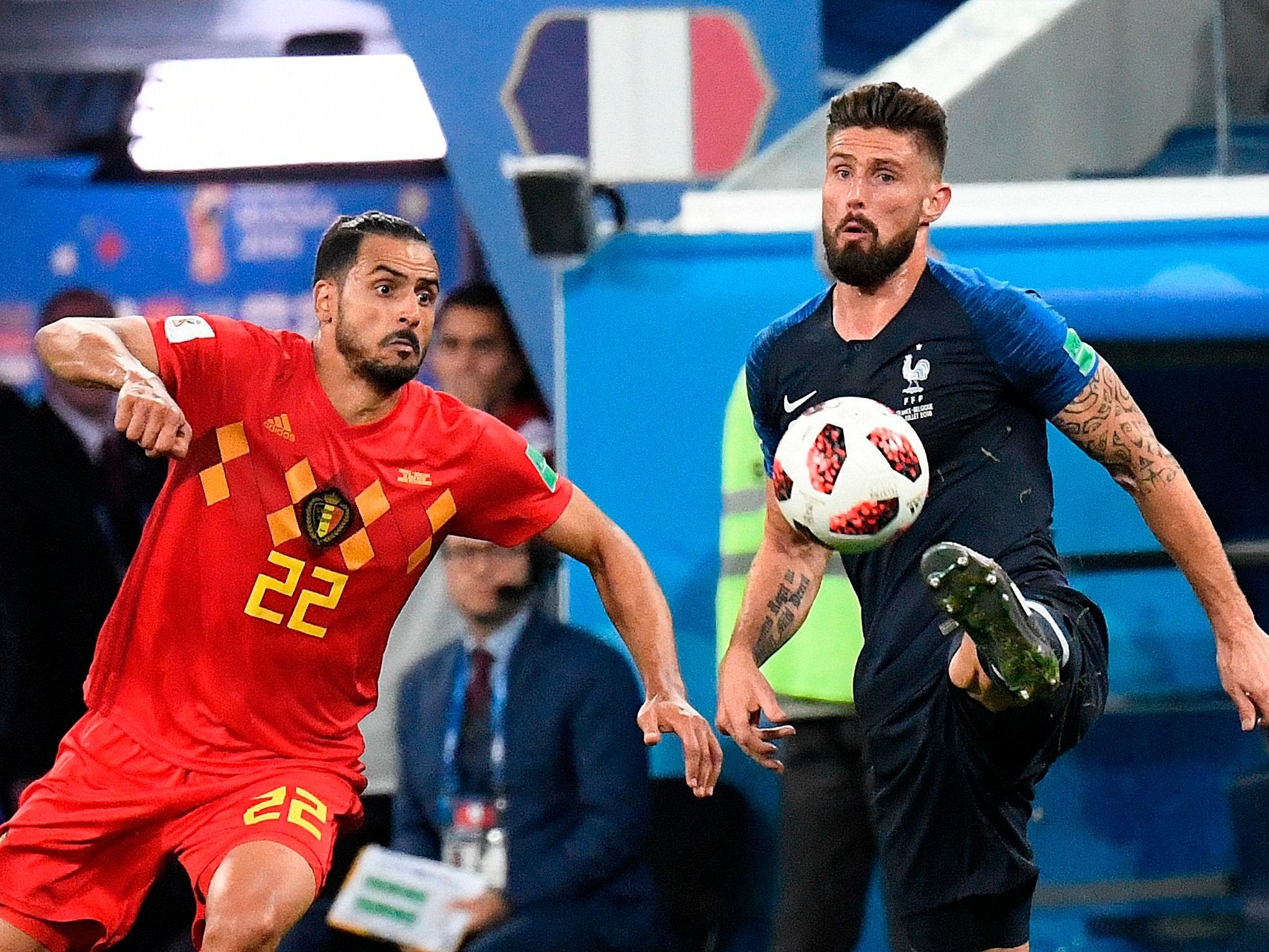World Cup 2018: How France exposed Nacer Chadli and turned defence into attack to nullify Belgium’s flair
Olivier Giroud may have been off the pace for much of the match but his role in triggering France’s transition into attack meant that they were able to soak up what Belgium had to offer

Your support helps us to tell the story
From reproductive rights to climate change to Big Tech, The Independent is on the ground when the story is developing. Whether it's investigating the financials of Elon Musk's pro-Trump PAC or producing our latest documentary, 'The A Word', which shines a light on the American women fighting for reproductive rights, we know how important it is to parse out the facts from the messaging.
At such a critical moment in US history, we need reporters on the ground. Your donation allows us to keep sending journalists to speak to both sides of the story.
The Independent is trusted by Americans across the entire political spectrum. And unlike many other quality news outlets, we choose not to lock Americans out of our reporting and analysis with paywalls. We believe quality journalism should be available to everyone, paid for by those who can afford it.
Your support makes all the difference.France’s 1-0 victory over Belgium wasn’t quite the match it might have been. With four of the world’s most exciting attacking talents on the pitch together, a variety of dynamic midfielders and centre-back pairings comfortable in a high defensive line, this could have been fast-paced, frantic, end-to-end.
Instead, it was something different entirely, based around patience, turnovers and the odd counter-attack. It was intriguing rather than enthralling, and the first goal was always likely to be crucial.
With the exception of Blaise Matuidi returning following suspension, Didier Deschamps’ starting XI is now set in stone. The onus was therefore on Roberto Martinez to spring a tactical surprise, and he selected a conventional 4-3-3 formation for the first time in this tournament, with Romelu Lukaku returning to his centre-forward role, and Nacer Chadli deputising for the suspended Thomas Meunier at right-back. Chadli was the game’s freest player for long periods, with Matuidi tucking inside to help shut down De Bruyne. France repeatedly invited the pass from Belgium’s centre-backs into Chadli, who couldn’t take full advantage of his freedom to conjure up something special. Other attacking threats were marked more tightly.
Belgium dominated the opening stages, with France sitting back in an extremely deep, compact block. Antoine Griezmann and Olivier Giroud were often midway inside their own half, blocking balls into Belgium’s midfielders rather than pressuring Belgium’s centre-backs. Aside from continually feeding the ball out to Chadli, Belgium also looked to Eden Hazard, who showed bursts of acceleration to find space. Neither he nor De Bruyne could combine successfully with Lukaku, however, who was kept quiet by Samuel Umtiti and the outstanding Raphael Varane.

France were looking to transitions for their moments of attacking inspiration, with Kylian Mbappe the main threat. He burst down the right and crossed dangerously in the opening minute, but thereafter was denied space by the conservative positioning of Jan Vertonghen, who often appeared more like part of a three-man defence rather than a left-back. Those had a running battle throughout the game, with Vertonghen twice fouling Mbappe crudely after the ball had gone, and while the PSG attacker was a constant threat, he didn’t quite showcase the game-changing pace we witnessed against Argentina. A couple of flicks, however, were breathtaking.

Towards the end of the first half, Martinez surprisingly decided to switch Hazard, who had started on the left, and Marouane Fellaini, the number ten. This was a curious move, perhaps designed to push Fellaini up against Benjamin Pavard, but Belgium created nothing of note through that approach, while Hazard was much quieter from a permanently central position, shut down by his club teammate N’Golo Kante. The approach continued into the second half, and for long periods as Belgium were chasing the game.
It was something of a shame that such a tight, tense and high-quality game was settled by a set-piece, although France never really looked like scoring in open play. Giroud, whose hold-up play has benefited France throughout this tournament, looked tired and was constantly two yards too slow to reach potential chances, often throwing himself hopefully at the ball when quicker strikers would have been capable of attempting proper shots. One moment, when Mbappe squared towards Giroud on the volley after a good diagonal ball from Griezmann, found him wanting. He did, however, win the crucial corner for Umtiti’s winner, assisted by Griezmann’s corner.
Martinez’s inevitable first change was introducing Dries Mertens, who had been dropped from the side when De Bruyne was pushed into the forward line against Brazil. De Bruyne dropped back into the midfield, in place of Mousa Dembele, and was immediately a crossing threat from the inside-right zone he works excellently for Manchester City. Now Matuidi’s narrow positioning looked dangerous: De Bruyne worked triangles with Chadli and Mertens, and Belgium crossed dangerously. Varane, however, was generally on hand to head clear.
Martinez’s other change was introducing Yannick Ferreira-Carrasco, a quick winger, in place of Fellaini. This was more surprising, considering Fellaini appeared the perfect Plan B. Belgium’s right-sided crosses combined with Fellaini’s height would surely have been a useful, if simple, weapon.
Deschamps changed little until the latter stages, with Steven N’Zonzi offering extra height, and Corentin Tolisso extra mobility. Griezmann also played more from the left, meaning France defended as a 4-5-1 rather than a 4-4-2. France still seem slightly underwhelming considering the attacking potential in this XI, but since they’re only 90 minutes away from winning their second World Cup, Deschamps is unlikely to change anything ahead of Sunday’s final.
Join our commenting forum
Join thought-provoking conversations, follow other Independent readers and see their replies
Comments